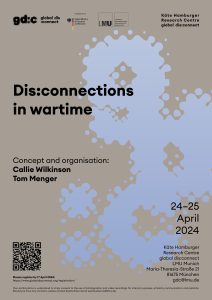24-25 April, Disconnections in wartime 1750-1945

Perhaps nothing demonstrates the complexities of globalisation more clearly than war. The international reverberations of Russia’s invasion of Ukraine have painfully exposed the interconnected nature of modern economies and our vulnerability to forces beyond our control, prompting anxious speculations about deglobalisation. Yet, experts agree that the more likely outcome is not isolation, but instead, changing geographies of connection. Similarly, recent historical scholarship has complicated conventional understandings of war as a dividing force, instead emphasizing both the connections and disconnections that it brings in its wake. In wartime, enemies are dehumanised in government propaganda, travel is disrupted, and trade blockades are enforced.
Wartime is associated with absences, interruptions, and detours, as lives are lost, scientific exchanges are cut off, and mobilized populations find themselves transported far from home. Yet, war can also create new spaces of interaction and encounter, sometimes across enemy lines. Some of these exchanges are illicit, such as smugglers who evade military blockades, or spies who penetrate enemy territory. Others are more overt, between prisoners of war and their captors, or surgeons who treat enemy combatants. War can provide the impetus for new connections and the widening of geographical horizons in the pursuit of resources, sometimes with lasting consequences. War, in other words, is the optimal lens through which to trace global connections and disconnections.
Place & date: Munich, 24-25 April 2024
Organisers: Callie Wilkinson and Tom Menger (LMU Munich)
Venue: Käte Hamburger Research Centre global dis:connect, Maria-Theresia-Straße 21, 81675 Munich
Please click here to download the programme.
Please register here by 17 March.





